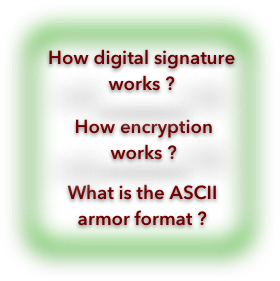How digital signature works ?
The hash of the message or data to be signed is calculated , and after that it is encrypted using the sender private key . Later on the hash can either be attached to the message or data and transmitted with it , or it can be sent separately .
To authenticate the received message or data , the sender public key is used to extract the encrypted hash from the signature. The received data or message hash is calculated , and compared to the extracted hash , if they are equal the message is authenticated .
@debian:~$ gpg --generate-key
# Generate a private and a public key by using GnuPG
gpg (GnuPG) 2.2.12; Copyright (C) 2018 Free Software Foundation, Inc.
This is free software: you are free to change and redistribute it.
There is NO WARRANTY, to the extent permitted by law.
gpg: keybox '/home/difyel/.gnupg/pubring.kbx' created
Note: Use "gpg --full-generate-key" for a full featured key generation dialog.
GnuPG needs to construct a user ID to identify your key.
Real name: difyel
Email address: difyeld@gmail.com
You selected this USER-ID:
"difyel <difyeld@gmail.com>"
# GnuPG creates the user ID of the holder of the key ,
# as such it asks certain questions .
# It will also ask for a passphrase to protect the
# generated Private key . The passphrase is used to
# encrypt and decrypt the private key .
Change (N)ame, (E)mail, or (O)kay/(Q)uit? O
We need to generate a lot of random bytes. It is a good idea to perform
some other action (type on the keyboard, move the mouse, utilize the
disks) during the prime generation; this gives the random number
generator a better chance to gain enough entropy.
gpg: /home/difyel/.gnupg/trustdb.gpg: trustdb created
gpg: key FD03F9275A65B11A marked as ultimately trusted
gpg: directory '/home/difyel/.gnupg/openpgp-revocs.d' created
gpg: revocation certificate stored as '/home/difyel/.gnupg/openpgp-revocs.d/468547ECCE69424D64983453FD03F9275A65B11A.rev'
public and secret key created and signed.
pub rsa3072 2020-02-04 [SC] [expires: 2022-02-03]
468547ECCE69424D64983453FD03F9275A65B11A
uid difyel <difyeld@gmail.com>
sub rsa3072 2020-02-04 [E] [expires: 2022-02-03]
# Line 35 contains the fingerprint of the created
# public key .
@debian:~$ gpg --list-secret-keys
# List the stored secret keys .
/home/difyel/.gnupg/pubring.kbx
--------------------------------
sec rsa3072 2020-02-04 [SC] [expires: 2022-02-03]
468547ECCE69424D64983453FD03F9275A65B11A
uid [ultimate] difyel <difyeld@gmail.com>
ssb rsa3072 2020-02-04 [E] [expires: 2022-02-03]
@debian:~$ echo "This is a message" >> message
# Create a message to sign .
@debian:~$ gpg --default-key "468547ECCE69424D64983453FD03F9275A65B11A" --sign message
# --sign option is used to sign a message or data.
# This will create a file named
# message.gpg .
# The --default-key option is used to specify the
# private key to sign with .
# The message is signed using the private key
# with the fingerprint
# 468547ECCE69424D64983453FD03F9275A65B11A
# gpg will ask for its passphrase .
# If the --default-key option is not used , then
# The key used for signing , is the first private
# key found in the stored keys .
gpg: using "468547ECCE69424D64983453FD03F9275A65B11A" as default secret key for signing
@debian:~$ gpg --verify message.gpg
# The --verify option can be used to verify
# a digitally signed message . GPG will
# automatically locate the public key used to
# verify the message .
# --verify ,Verify the signature of the message
gpg: Signature made Tue 04 Feb 2020 05:48:01 AM EST
gpg: using RSA key 468547ECCE69424D64983453FD03F9275A65B11A
gpg: Good signature from "difyel <difyeld@gmail.com>" [ultimate]
# The signature was successfully verified .
@debian:~$ gpg --decrypt message.gpg
# The --decrypt option can be used to verify
# and extract a digitally signed message .
# GPG will automatically locate the public key
# used to verify the message .
This is a message
gpg: Signature made Tue 04 Feb 2020 05:48:01 AM EST
gpg: using RSA key 468547ECCE69424D64983453FD03F9275A65B11A
gpg: Good signature from "difyel <difyeld@gmail.com>" [ultimate]
# The extracted message is highlited in line 87
